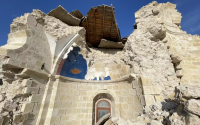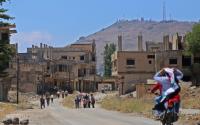21 April 2006Zarrin T. CaldwellOneWorld US
"The wrongs which we seek to condemn and punish have been so calculated, so malignant and so devastating, that civilization cannot tolerate their being ignored, because it cannot survive their being repeated." Robert Jackson, Chief Prosecutor The Nuremberg Trials The incidents of mass atrocities we see on the nightly news—are they genocide? When large groups are being murdered or driven to physical destruction because of their race or religion, how could it not be? But while some say it is, others say no. Should it matter?
 |
The International Military Tribunal at the opening session of the trial of war criminals at Nuremberg, Germany; 1945. © U.S. Holocaust Memorial Museum |
In fact, the debate over when to define such incidents as "genocide" would fill volumes. Today, so much time is often spent discussing whether to call something "genocide," that valuable time is lost addressing the conflict itself. Witness the murder of some 800,000 Tutsis and moderate Hutus in Rwanda in the space of around 6 weeks in 1994 while the international community tried to decide whether genocide was really taking place and what to do about it. Although much soul searching has since taken place at the United Nations on why the international community was not able to prevent this atrocity—or the one in the Bosnian town of Srebrenica a year later—many assert that it is still happening in 2006 in western Sudan, or is at risk of occurring in places like Cote d'Ivoire.
Historical Roots Raphael Lemkin, a Polish-born jurist who served as an adviser to the U.S. Department of War during World War II, first coined the term "genocide" and defined it as "the criminal intent to destroy or to cripple permanently a human group." Many would argue that genocide is not a new phenomenon and has been practiced for centuries. According to the
Encylopedia Brittanica, for example, it was common in ancient times for victors in war to massacre all the men of a conquered population. It was only about 60 years ago, however, that the UN General Assembly made the crime of genocide punishable under international law. The shock of Nazi Germany's mass extinction of some 6 million Jews and millions more Poles and Soviet prisoners during World War II led to the
Nuremberg Trials from 1945-1949 in which Nazi war criminals were charged with "crimes against humanity." Although some criticized these trials because the war's winning powers took on the role of judge and prosecutor, they nonetheless set precedents for holding individuals—not just states—accountable for heinous crimes. And they gave momentum to the effort to codify laws to combat genocide. The
Convention on the Prevention and Punishment of the Crime of Genocide entered into force a few years later in 1951. Genocide is defined in this Convention as "the intentional physical destruction of groups in whole or in part." For these purposes, "groups" can be defined by their national, ethnic, racial, or religious characteristics. Despite some inherent flaws in the Convention—like its lack of enforcement provisions—it has nonetheless helped to establish a body of customary international law against such extreme abuses. As signatories, 137 states have acknowledged a clear moral and legal obligation to prevent and punish genocide.
When Is It "Genocide"? Perpetrators of mass atrocities will often claim that they have not committed genocide because there was no specific "intent" to annihilate a group, but that these victims were simply casualties of war, or a threat to national order. Many Turks would not agree, for example, that the massacres of Armenians in 1915-16 constituted genocide; the former Iraqi regime under Saddam Hussein would not agree that its use of chemical warfare against the Kurds in the 1980s was genocide; nor would the Bosnian Serb Army Commander Ratko Mladic and his supporters agree that the 1995 massacre of thousands of Muslim men and boys in the town of Srebrenica was genocide.
 |
Sudanese refugees who fled to eastern Chad to escape fighting in Darfur, western Sudan; 2004. © Amnesty International |
Human rights organizations, in contrast, have generally disagreed with these assessments, have brought attention to the abuses taking place, and have tried to ensure that perpetrators are not able to commit such crimes with impunity—through their support of institutions like the new
International Criminal Court in The Hague, for example. There is still significant debate today about whether to call the killing of an estimated 200-400,000 civilians in Sudan's Darfur region "genocide." Allegedly government-supported militias (the Janjaweed) are carrying out these atrocities, but the Sudanese government claims these militias are not an instrument of their policy. Non-governmental organizations (NGOs) like
Africa Action,
Amnesty International, and
Human Rights Watch—just to name a few—claim, in contrast, that the Sudanese government and its allied Arab militia are implementing a strategy of ethnic-based murder, rape, torture, and forcible displacement of civilians in Darfur. Contrary to the position of many other member states at the UN that are only willing to call it a "humanitarian crisis," the conflict in the Sudan is one of the few that the U.S. government has—at least at one time—been willing to label "genocide." Using this term implies an obligation to take action to protect civilians, but such action by the U.S. on Sudan remains inadequate, say many NGOs. NGOs and others assert, however, that it is important not to get bogged down in the debate over whether to call something "genocide." As Juan Mendez, the UN Special Adviser on Genocide Prevention,
stated in February 2006, "Many times the debate about whether something is genocide or not has substituted for the decision to act to prevent it, and that is a paralyzing, very sterile debate." What is more vital, adds UN Secretary-General Kofi Annan, is that the perpetrators of the violence are held accountable so that "such grave crimes, whatever they may be called, cannot be committed with impunity."
Peacekeeping Revisited Many of those working in international organizations or with civil society groups have long suggested that rapidly deployable—and more effective—peacekeeping operations would go a long way to helping to stop mass atrocities such as genocide. The key term in this phrase is "rapid." With rare exceptions like the UN Operation in the Congo in 1960, it usually takes several months to put forces on the ground from the time the UN Security Council decides to establish a peacekeeping mission. Denmark, the Netherlands, and Canada have been at the forefront of proposing "high readiness brigades" that could move into an area much more quickly to both secure the peace and prevent atrocities.
 |
UN Mission in the Democratic Republic of the Congo (MONUC). Pakistani peacekeepers arrive in Ituri province, DRC, with re-enforcements of troops and ammunition to secure the area following brutal militia fighting and massacres; January 2005. © Christophe Boulierac / DPI / United Nations |
Since 2000, such a
State of High Readiness Brigade (SHIRBRIG) has come into existence, but deployments focus more on the peaceful settlement of disputes than on taking robust action. Sensitivities about command and control arrangements, training problems with multinational forces, and a lack of willingness to foot the bill have hampered progress to date. United Nations member states are often concerned about any initiative that may be perceived to infringe on their "national sovereignty;" hence, there are many political hurdles to overcome before forces can be dispatched. But views about peace operations have also gradually been changing. A
report released by the
US Institute of Peace in June 2005, for example, noted that a fundamental shift is underway in UN peacekeeping. More robust methods are being used to protect civilians and go after those who are considered "spoilers" of peace agreements, notes the report, which also calls for the creation of a rapid reaction force. A
Christian Science Monitor article on the report's release notes that UN peacekeepers are getting a stronger mandate and are "pushing the boundaries of impartiality in an effort to restore lost credibility" after a string of failures in the 1990s. While the UN has prided itself on being an impartial body, there have been growing questions about the appropriateness of maintaining neutrality in all circumstances. As a UN peace operations panel noted in their
Brahimi Report released in 2000, "No failure did more to damage the standing and credibility of United Nations peacekeeping in the 1990s than its reluctance to distinguish victim from aggressor." The Brahimi report was a catalyst for changing UN thinking on these values.
The Duty to Protect In commenting on the massacre in Srebrenica, UN Secretary-General Kofi Annan noted that a "deliberate attempt to terrorize, expel or murder an entire people must be met decisively with all necessary means." These means can include a variety of political carrots and sticks, public condemnation, economic sanctions, or, as a last resort, some form of military intervention.
While some NGOs, like the American Friends Service Committee, advocate a
nonviolent approach to such conflicts, others believe that military—or at least policing—solutions may sometimes be necessary. Refugees International has
recommended to the U.S. government, for example, that it should prepare "for the necessity of taking a hard line against perpetrators of genocide." This stance underlies a growing recognition in international circles that there is "
a responsibility to protect" civilians from terrible atrocity crimes. An independent
International Commission on Intervention and State Sovereignty—established by the Canadian government in 2000—tried to forge a consensus on these ideas. They also proposed clear guidelines to ensure that interventions—military or otherwise—were not politically motivated. Among others, crimes have to be widespread and systematic to warrant intervention, said their report. Although international law has traditionally supported a "hands off" policy regarding a state's domestic affairs—and states continue to accept few limits on their "national sovereignty"—humanitarian intervention has occasionally been justified in exceptional circumstances, such as interventions in Somalia and Kosovo. Human rights law has also evolved a great deal over the past 50 years, with far more attention paid to protecting individuals from violations committed by erring governments. And, as
International Crisis Group President Gareth Evans
noted in August 2004, "There has been an increased willingness to challenge the 'culture of impunity' through new international criminal courts," a "greatly increased reliance on peacemaking initiatives and negotiated peace agreements," an "equally dramatic increase in complex peace operations focusing on post-conflict peace building," and "a significantly greater Security Council willingness to authorize the use of force, which has helped deter aggression and sustain peace agreements." He adds that these efforts have made a difference and that, contrary to conventional wisdom, the number of people killed each year in violent armed conflicts has significantly declined from a high point in the late 1980s and early 1990s.
Calling All Leaders Governments have a lot of options at their disposal to step in to stop mass atrocities, including drawing from a range of political, legal, economic, and military sanctions. The reality is, however, that they are not always willing to employ these options in deference to their own perceived interests. Absence of political will and resolve among UN member states, combined with a lack of effective and centralized enforcement, has generally been a recipe for inaction. Responses usually end up being very ad-hoc in nature—or, in the words of some commentators, the international community simply "muddles through."
Speaking at the
United States Holocaust Memorial Museum in 2004, Samantha Power, author of the Pulitzer Prize-winning book A Problem from Hell: America and the Age of Genocide, offered several prescriptions for addressing genocide more effectively. Among these were avoiding the semantic debate, for governments to apply a much broader range of options from the policy toolbox, equipping decision makers to see the human faces involved, and to have more of a conversation across borders about alleviating such tragedies. In reference to the role of citizens, she added "for the most part, we haven't succeeded in convincing our policy makers and our politicians that they would pay a political price for being a bystander to genocide....A non-response to genocide doesn't occur in a vacuum. A non-response is affirmed by societal silence. It becomes an excuse. It is the excuse that political leaders point to."










